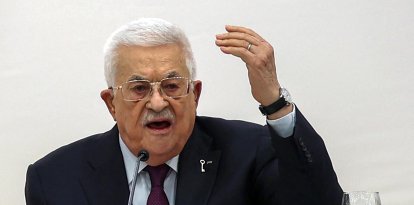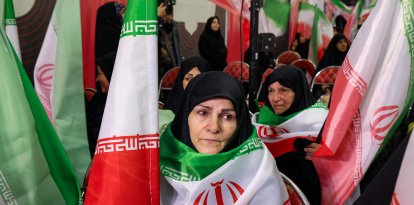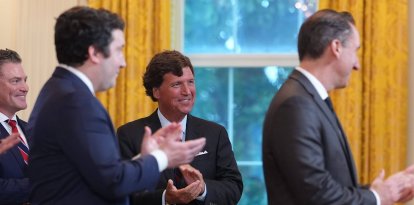How much trust has Trump earned in the Middle East?
Eschewing both nation-building and appeasement is wise. But an embrace of Qatar’s agenda—and gifts—undermines confidence that his decisions advance U.S. national interests.
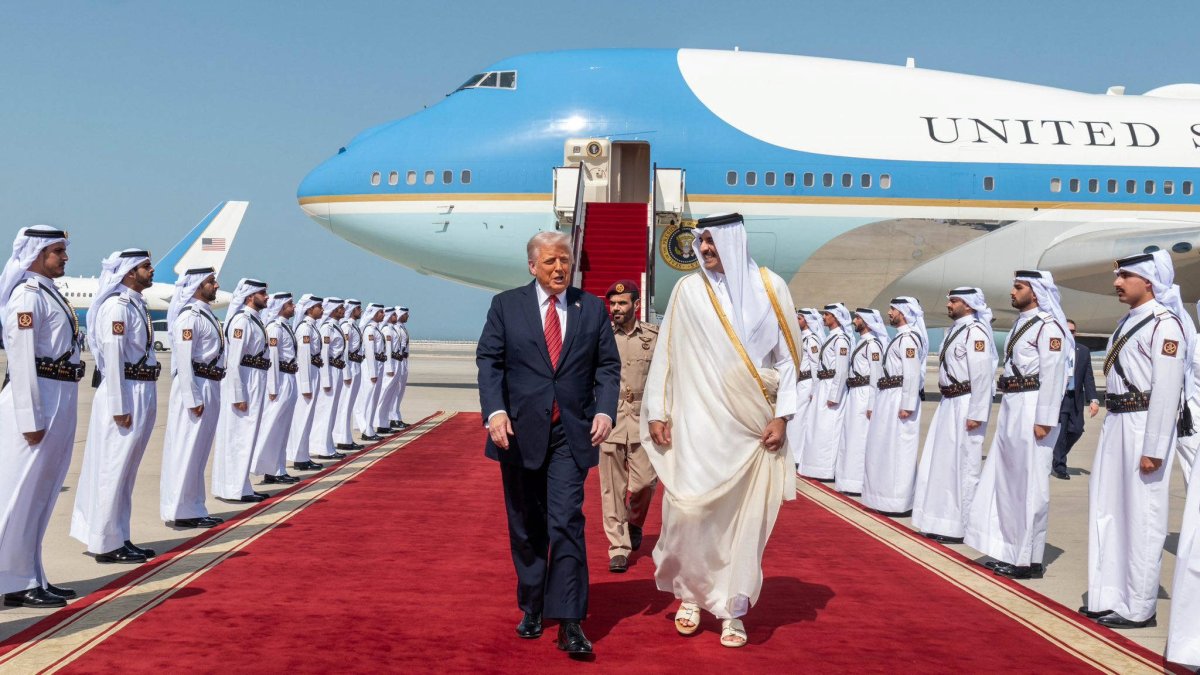
The Emir of Qatar welcomes US President Donald Trump
What exactly is President Donald Trump trying to accomplish in the Middle East? That’s not an easy question for either his supporters or his detractors to answer after a tour that emphasized closer relations with Saudi Arabia and Qatar, as well as a renewal of relations with Syria, and a major policy speech that laid out American goals in the region.
The address emphasized Trump’s belief in expanding trade and rejection of nation-building, in addition to attempts to impose American values on the region. It was an important and long-overdue acknowledgement of the need for the United States to reject the actions of the Obama and Biden administrations, which emphasized appeasement of Iran and downgrading of relations with allies like Israel and Saudi Arabia, as well as the crusade for imposing democracy on the region embraced by the George W. Bush administration. In its place, Trump set forth a rational and realistic agenda of promoting security through strength and commerce, with a push for the Arab and Muslim world to join the Abraham Accords and normalize relations with Israel.
But the speech wasn’t the focus of most of the commentary. Instead, the headlines were about the airplane for future use as Air Force One, given to him by the rulers of Qatar. And if that blatant instance of trying to buy influence wasn’t enough, Doha also sealed a deal with the Trump real estate company to build a golf resort in the desert emirate.
This understandably raised the hackles of conservative pro-Israel Trump backers and the usual chorus of Trump haters in the mainstream corporate media and political opponents. Whether coming from the right or the left, critiques of his judgment in accepting this “gift,” coupled with the atrocious timing and dubious judgment of the real estate deal, were entirely well-founded.
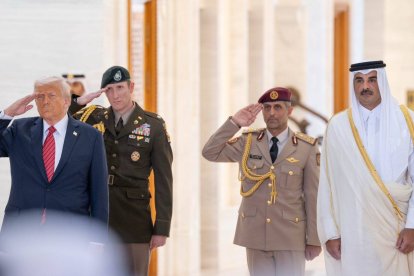
Presidente Donald Trump en su visita a Oriente Medio
A frenemy in Doha
Qatar’s status as a frenemy of the United States is well-established. While it hosts an American military base and often speaks as if it is an American ally, it is also closely aligned with Iran. More than that, it is a primary funder of Hamas, hosts the ideological leader of the Muslim Brotherhood, and spends heavily to spread Islamist and antisemitic ideas in the United States on college campuses and in mosques. Its influence is exactly what the Trump administration is seeking to combat in its essential efforts to force institutions of higher education to stop tolerating and enabling Jew-hatred and anti-American indoctrination. On top of that, it also hosts/runs Al Jazeera, the international outlet that is a primary source of anti-American and anti-Israel propaganda that operates under the guise of a news channel.
That several administrations of both parties have continued this toxic relationship with Doha when they should have all cut off relations with it is bad enough. But for Trump to be championing it personally—and largely because, knowing his vanity, the Qataris are flattering and showering him with presents—is indefensible.
And we didn’t have to wait long to see the fruits of Qatar’s charm offensive.
Reasons for concern
During the course of the week, not only did the Qataris help broker a deal to gain the release of 21-year-old Edan Alexander, the last hostage being held by Hamas with American citizenship. Rumors were also flying around the region and in Washington that Doha was successfully nudging the United States and its witless Middle East envoy Steve Witkoff, who is already compromised by a financial bailout given him by the Qataris, toward both a broader ceasefire agreement with Hamas and a new nuclear deal with Iran.
A new pact with Hamas—notwithstanding Trump’s demands that the terror group be eradicated and replaced with some sort of American-run Gaza—could allow Qatar’s ally to survive and retain control of the Strip. Negotiations with Iran also seem to be oriented toward allowing it to retain its nuclear program under the dubious notion that the oil-rich nation required it for civilian purposes to produce more energy.
Either prospective agreement would be a disaster for American interests and a deadly threat to Israel’s security.
Even more surprising was the Qatar-Saudi-supported Trump decision to lift sanctions on the new regime running Syria, headed by former ISIS terrorist Ahmed al-Sharaa, whom the president met. The Islamists in Damascus are reportedly also dangling the possibility of their own real estate bribe to Trump. Given that there is no reason to trust that al-Sharaa and his jihadist government will be a stabilizing force or have given up their extremist stands, the U.S. decision to normalize relations with it was, at best, premature.
Add to that list of troubling decisions was Trump’s declaration of a ceasefire between the United States and the Houthis in Yemen, despite the fact that the Iranian-backed terrorists have shown no other signs of giving up its efforts to interdict international shipping in the Red Sea or stop firing missiles and drones at Israel in an effective but harmful effort to aid Hamas.
To make supporters of Israel even more nervous was the obvious absence of Israel on Trump’s itinerary or much sign that he was coordinating or consulting with Jerusalem about any of this.
Does this mean that Trump 2.0 will be as damaging to Israel as his first administration was supportive?
The only honest answer to that question is that we don’t yet know, though given his priorities and basic approach to relations with the nations of the region, there is reason to believe that it could all turn out to the benefit of the interests of the United States and Israel.
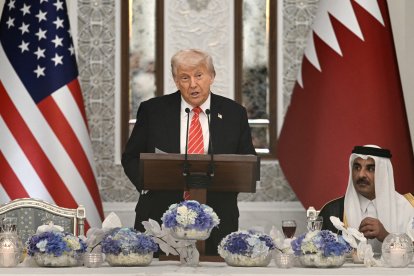
US President Donald Trump (L) delivers a speech as Qatar's
A rational policy approach
And that is why Trump’s policy speech deserves as much scrutiny as his unfortunate current dealings with Qatar. It should be understood as a fundamental rejection of his predecessors’ approach to the region, and that (worries about Qatar, Hamas and Iran, nonetheless) is a good thing.
Trump railed against the “neocons” who ran foreign policy under the last Bush administration for sinking the United States in quagmires in Iraq and Afghanistan with the aim of, among other things, converting those countries into something resembling Western-style democracies. However well-intentioned that effort was, it turned out to be a fool’s errand, and the president is right to say so.
Equally wrongheaded was the Obama and Biden effort to appease Iran, which was not so much the result of bad bargaining skills but an actual desire for a rapprochement with Tehran. The goal was to embrace its leaders and essentially have the country replace Israel and the Saudis as a key American ally. That was not so much dumb as utter madness.
Obama’s 2015 nuclear deal with Iran enriched and empowered the Islamist regime, allowing it to engage in foreign adventures, spread its influence and foment terrorism aimed at toppling American allies and undermining U.S. interests.
Just as damaging was the way that, despite the outreach to the brutal Iranian tyranny, Obama and Biden both also framed their approach to the region in terms that were echoed by international human-rights groups that sought to undermine both Riyadh and Jerusalem.
Trump is rightly disdainful of this approach since it ignores the fact that moderate Arab regimes like the one in Saudi Arabia are, for all of their faults, far less of a threat to the interests of the West and their own people than that of the Iranians and their terrorist proxies. It also wrongly accepted the false Palestinian narrative about Israel being a brutal “occupier” and human-rights abuser rather than the only democracy in the region. If Israel is forced to use its military power against its enemies, it is because the Palestinians, the Iranians and their allies are still determined to pursue the destruction of the only Jewish state on the planet.
In place of both sets of misguided policies, Trump offers something that sounds less idealistic, but which is much better-suited to help the people of the region and bolster American interests.
Trump sees trade and the abandonment of war as key to a better future. He is prepared to make peace with any regime that is ready to give up the long Muslim-Arab war on Israel and engage in commerce with it and the United States. “Peace to Prosperity” was the title of the Mideast plan that Trump offered the Palestinians in 2020, which they rejected out of hand. The emphasis on economic ties and putting aside squeamishness about the authoritarian nature of the Saudi and other Gulf state regimes remains entirely rational and more likely to accelerate the process by which these nations become less oppressive. Not to mention the fact that doing so helped break down the effort on the part of the Palestinians and Iranians to maintain the isolation of Israel and to keep the destructive war against it going.
Trump’s decision to engage with the new government in Syria may prove foolish, but if it follows his advice and normalizes relations with Israel—and becomes another moderate government seeking engagement with the West—then his move will prove to be wise. The same is true of his commitment to keep growing closer with the Saudis and their modernizing leader, Crown Prince Muhammad bin Salman.
The same principles seem to be behind the administration’s testing of the waters with Iran and even its plans for Gaza.
The catch to all of this is that there is very little apparent reason to believe that Tehran or Damascus can or will pursue such a rational policy. The same could be said for the prospects that growing close to Qatar will advance peace or American interests, even if making nice with Doha may be personally profitable for the Trump family and Witkoff, a factor that renders anything the administration does ethically questionable even if the rosiest of scenarios about their goodwill to the West proved to be true rather than wishful thinking.
So, how can it all turn out well?
The answer is that because Trump views foreign policy as a purely transactional business, he isn’t handicapped by the idealism of Bush or the feckless belief in appeasement and diplomacy for its own sake of Obama and Biden. He is, whatever one thinks of him, someone who knows the difference between a good deal and a bad one. If he is prepared to let bygones be bygones with groups like the Houthis or the Iranians, it is only if they conform to his ideas of how they should behave.
It is because Trump believes that American national interests must be the paramount concern of its government and diplomats, rather than other agendas that are disconnected from them, that it’s possible to believe that he will be able to judge his dealings with Qatar, Iran, Syria and any other country on the results rather than ideology.
Will that happen? We don’t know.
No one’s sucker
Even if his characteristic embrace of any leader or country that flatters him is a terrible look and undermines confidence in his judgment as well as American national interests, this is also a president who has earned some trust from both Americans and Israelis.
Whether he coordinates with Jerusalem or not at every turn, his goals are still laudable. His consistent advocacy for normalization and the expansion of the Abraham Accords, as well as his basic positions opposing Iran’s nuclear program or the survival of Hamas, ought to inspire at least some confidence that he won’t accept a warmed-over replica of Obama’s dangerous nuclear deal or an equally catastrophic plan for Gaza that will empower the terrorists. Above all, it’s hard to imagine him passively accepting a diplomatic outcome in which Washington will be Tehran’s patsy. Trump is a lot of things, but he is no one’s sucker.
Faith in his good sense is hard to maintain while observing these recent escapades. Still, Trump’s decision to try diplomacy before reverting to force against Iran, added to his embrace of dubious partners, can be vindicated if he is able to dispassionately analyze the outcome of these gambits. Those willing to damn him as a betrayer of Israel or as hopeless a dupe of Iran as Obama need to avoid jumping to such conclusions in the absence of proof that the administration is actually abandoning a hard-headed pursuit of realpolitik national advantage.
Until then, the rational answer to the question of what the president is doing right now must rest on the assumption that he will reverse course if his new friends prove untrustworthy or treacherous, along with an acknowledgement that if he’s proven right, it will be of inestimable benefit to all.
© JNS















